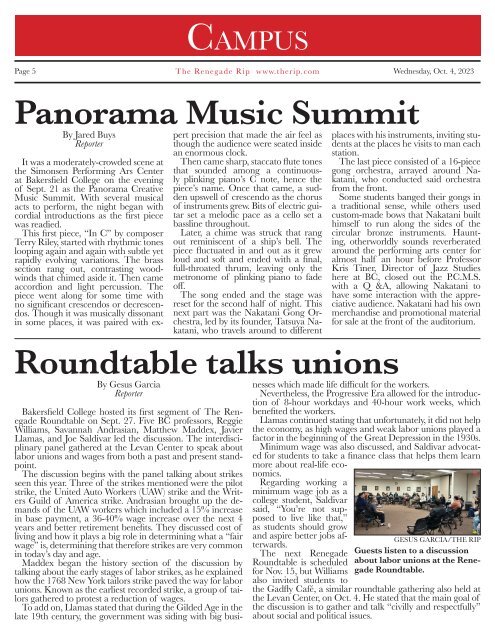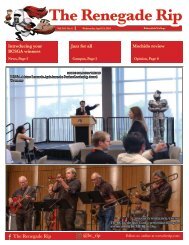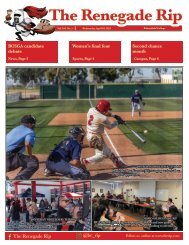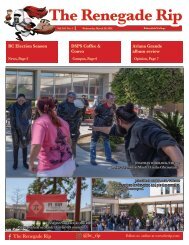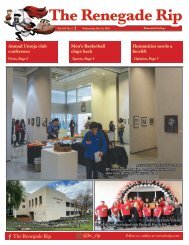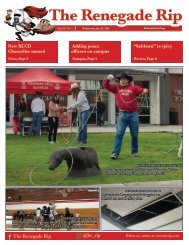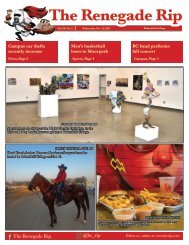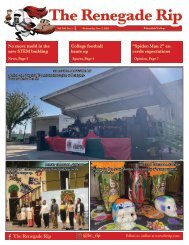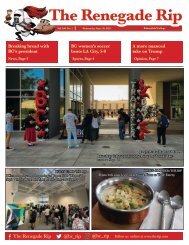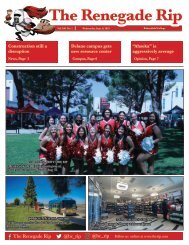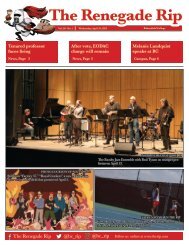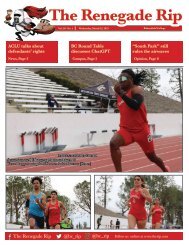Renegade Rip, issue 3, Oct
Bakersfield College's student news publication.
Bakersfield College's student news publication.
You also want an ePaper? Increase the reach of your titles
YUMPU automatically turns print PDFs into web optimized ePapers that Google loves.
Page 5<br />
Campus<br />
The <strong>Renegade</strong> <strong>Rip</strong> www.therip.com<br />
Wednesday, <strong>Oct</strong>. 4, 2023<br />
Panorama Music Summit<br />
By Jared Buys<br />
Reporter<br />
It was a moderately-crowded scene at<br />
the Simonsen Performing Ars Center<br />
at Bakersfield College on the evening<br />
of Sept. 21 as the Panorama Creative<br />
Music Summit. With several musical<br />
acts to perform, the night began with<br />
cordial introductions as the first piece<br />
was readied.<br />
This first piece, “In C” by composer<br />
Terry Riley, started with rhythmic tones<br />
looping again and again with subtle yet<br />
rapidly evolving variations. The brass<br />
section rang out, contrasting woodwinds<br />
that chimed aside it. Then came<br />
accordion and light percussion. The<br />
piece went along for some time with<br />
no significant crescendos or decrescendos.<br />
Though it was musically dissonant<br />
in some places, it was paired with expert<br />
precision that made the air feel as<br />
though the audience were seated inside<br />
an enormous clock.<br />
Then came sharp, staccato flute tones<br />
that sounded among a continuously<br />
plinking piano’s C note, hence the<br />
piece’s name. Once that came, a sudden<br />
upswell of crescendo as the chorus<br />
of instruments grew. Bits of electric guitar<br />
set a melodic pace as a cello set a<br />
bassline throughout.<br />
Later, a chime was struck that rang<br />
out reminiscent of a ship’s bell. The<br />
piece fluctuated in and out as it grew<br />
loud and soft and ended with a final,<br />
full-throated thrum, leaving only the<br />
metronome of plinking piano to fade<br />
off.<br />
The song ended and the stage was<br />
reset for the second half of night. This<br />
next part was the Nakatani Gong Orchestra,<br />
led by its founder, Tatsuya Nakatani,<br />
who travels around to different<br />
places with his instruments, inviting students<br />
at the places he visits to man each<br />
station.<br />
The last piece consisted of a 16-piece<br />
gong orchestra, arrayed around Nakatani,<br />
who conducted said orchestra<br />
from the front.<br />
Some students banged their gongs in<br />
a traditional sense, while others used<br />
custom-made bows that Nakatani built<br />
himself to run along the sides of the<br />
circular bronze instruments. Haunting,<br />
otherworldly sounds reverberated<br />
around the performing arts center for<br />
almost half an hour before Professor<br />
Kris Tiner, Director of Jazz Studies<br />
here at BC, closed out the P.C.M.S.<br />
with a Q &A, allowing Nakatani to<br />
have some interaction with the appreciative<br />
audience. Nakatani had his own<br />
merchandise and promotional material<br />
for sale at the front of the auditorium.<br />
Roundtable talks unions<br />
By Gesus Garcia<br />
Reporter<br />
Bakersfield College hosted its first segment of The <strong>Renegade</strong><br />
Roundtable on Sept. 27. Five BC professors, Reggie<br />
Williams, Savannah Andrasian, Matthew Maddex, Javier<br />
Llamas, and Joe Saldivar led the discussion. The interdisciplinary<br />
panel gathered at the Levan Center to speak about<br />
labor unions and wages from both a past and present standpoint.<br />
The discussion begins with the panel talking about strikes<br />
seen this year. Three of the strikes mentioned were the pilot<br />
strike, the United Auto Workers (UAW) strike and the Writers<br />
Guild of America strike. Andrasian brought up the demands<br />
of the UAW workers which included a 15% increase<br />
in base payment, a 36-40% wage increase over the next 4<br />
years and better retirement benefits. They discussed cost of<br />
living and how it plays a big role in determining what a “fair<br />
wage” is, determining that therefore strikes are very common<br />
in today’s day and age.<br />
Maddex began the history section of the discussion by<br />
talking about the early stages of labor strikes, as he explained<br />
how the 1768 New York tailors strike paved the way for labor<br />
unions. Known as the earliest recorded strike, a group of tailors<br />
gathered to protest a reduction of wages.<br />
To add on, Llamas stated that during the Gilded Age in the<br />
late 19th century, the government was siding with big businesses<br />
which made life difficult for the workers.<br />
Nevertheless, the Progressive Era allowed for the introduction<br />
of 8-hour workdays and 40-hour work weeks, which<br />
benefited the workers.<br />
Llamas continued stating that unfortunately, it did not help<br />
the economy, as high wages and weak labor unions played a<br />
factor in the beginning of the Great Depression in the 1930s.<br />
Minimum wage was also discussed, and Saldivar advocated<br />
for students to take a finance class that helps them learn<br />
more about real-life economics.<br />
Regarding working a<br />
minimum wage job as a<br />
college student, Saldivar<br />
said, “You’re not supposed<br />
to live like that,”<br />
as students should grow<br />
and aspire better jobs afterwards.<br />
The next <strong>Renegade</strong><br />
Roundtable is scheduled<br />
for Nov. 15, but Williams<br />
also invited students to<br />
GESUS GARCIA/THE RIP<br />
Guests listen to a discussion<br />
about labor unions at the <strong>Renegade</strong><br />
Roundtable.<br />
the Gadfly Café, a similar roundtable gathering also held at<br />
the Levan Center, on <strong>Oct</strong>. 4. He stated that the main goal of<br />
the discussion is to gather and talk “civilly and respectfully”<br />
about social and political <strong>issue</strong>s.


